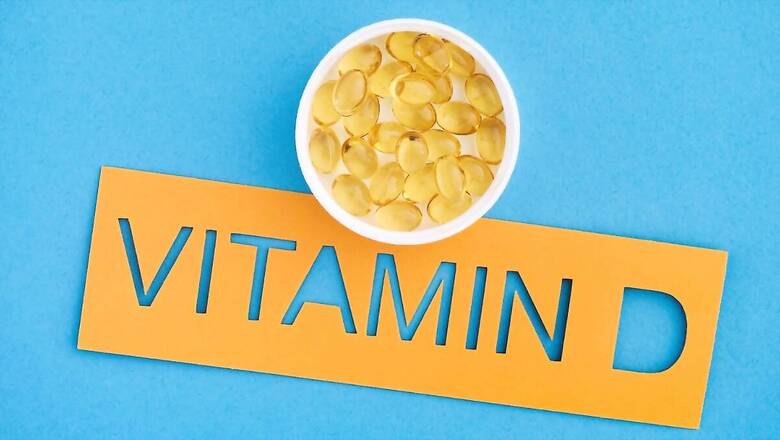
views
A 65-year-old male was referred to the department of nephrology at a top hospital after he reported symptoms of kidney failure. While he did not have any underlying health condition, he was disorientated and confused with very high calcium levels.
“It was during investigations we found that he had been loading himself up with Vitamin D supplements,” Dr Suman Lata, director of nephrology at Fortis Hospital in New Delhi’s Shalimar Bagh, told News18.com.
Flushing out the toxic load from this patient’s system took several days after he was put on intravenous fluids and medication.
The detailed history of the patient revealed that some time back, he was suffering from a prolapsed intervertebral disc for which he had been prescribed Vitamin D and calcium tablets.
“He did not follow up with his former doctor but continued to take Vitamin D tablets daily (which otherwise was a weekly dose) for more than six months. This led to the diagnosis of Vitamin D3 toxicity.”
It is not just Lata but many other doctors who are increasingly noticing people popping Vitamin D3 tablets without consulting medical experts and then landing themselves in bigger health troubles.
While there is growing awareness in the general population about the importance of Vitamin D, it has led to aggressive intake of the vitamin without medical indication and monitoring its present levels in the body.
Experts warn that overdose of Vitamin D3 leads to high calcium levels in blood which can prove dangerous and may result in kidney damage and abnormal heart rhythms.
Doctors highlight “worrying trend”
Dr Brij Vallabh, consultant of internal medicine at Narayana Multi Speciality Hospital in Jaipur, labelled the trend “highly concerning”.
“The growing incidences of people self-prescribing and overdosing themselves with Vitamin D3 are highly concerning,” he said.
Similarly, Dr Sakshi Singh, consultant at the department of internal medicine at Amrita Hospital in Faridabad, said she has seen certain cases where patients are presented with hypercalcemia and hypervitaminosis – both due to overload of Vitamin D3.
Hypercalcemia is defined as high concentration of calcium whereas hypervitaminosis occurs when the storage levels of vitamins are abnormally high in the human body.
“People are indeed becoming more and more aware of the deficiency, and getting themselves checked with easy accessibility of labs and testing services,” Singh said, adding that the point of concern is that many people are just getting a “bunch of tests done and starting the medication themselves, with a recommendation from medical stores, friends, relatives and internet knowledge without understanding the proper method of replacement”.
Many times, after starting supplementation, experts said people keep on taking the medicines without getting checked whether they require it further or not.
“Not everyone has the same level of deficiency so the treatment regimen also cannot be exactly the same. Also, more importantly, as much as the deficiency harms, even excess Vitamin D can do damage, ranging from mild to severe,” Singh pointed out.
According to Dr Manjeeta Nath Das from Narayana Superspeciality Hospital in Gurugram, “it is not uncommon for individuals to self-medicate with over-the-counter supplements like Vitamin D when they experience symptoms such as joint pain, body aches, and fatigue. We have witnessed many patients”.
Highlighting an important point, Dr Dilip Nandamuri, diabetologist at Yashoda Hospitals in Hyderabad, added that “Vitamin D toxicity is more likely to occur in individuals who take extremely high doses of Vitamin D supplements for an extended period, rather than from dietary sources or moderate supplementation”.
Also, the risk of overdose is influenced by factors such as age, weight, and individual variations in how the body metabolises Vitamin D. For instance, Nandamuri witnessed a patient who had to seek dialysis due to an overdose.
Signs to watch out for
Too much of Vitamin D leads to high calcium level in the body and causes harm. Extremely high levels of Vitamin D in the blood (greater than 150 ng/mL) can cause visible symptoms.
Some signs that can ring a bell are confusion, apathy, fatigue, recurrent vomiting, abdominal pain, excess urination, loss of appetite and dehydration — due to an imbalance of calcium in the blood.
Initial and mild symptoms can be reversed but doctors said advanced toxicity can lead to kidney dysfunction and calcium deposits in arteries which would not be reversible completely.
Vitamin D3 is a hormone supplement
Dr Rajeev Jayadevan, former president of the Kochi wing of the Indian Medical Association, explained that Vitamin D is not like Vitamin B or C and is actually a hormone supplement that needs to be used like other hormone supplements — based on medical assessment.
Sample this: We know that someone who is in good health should not suddenly start taking thyroid hormone without a doctor’s recommendation because it could even kill them. “The same principle applies to Vitamin D,” he said.
Incidentally, there is plenty of social media misinformation as well as poor quality medical studies claiming benefits for Vitamin D.
“Vitamin D is helpful in people who have a clinical deficiency in that hormone, and this must be clinically established rather than by a lab value or test report alone. It is also used in other selected medical conditions,” Jayadevan pointed out.
Benefits and dosage
According to experts, Vitamin D3 is an important pro-hormone which is fat-soluble in nature and critically important for the development, growth, and maintenance of a healthy skeleton.
“We need to treat the deficiency of vitamin D but not over-treat,” Singh from Amrita Hospitals said. “Vitamin D is an important vitamin for wholesome health and fitness. Its deficiency is one of the most commonly seen deficiencies in day-to-day patients visiting medical setups,” she added.
The common reasons include lack of proper and adequate dietary habits, insufficient exposure to natural sunlight, sedentary lifestyle, and an unhealthy gut due to unhealthy eating habits.
The recommended daily intake of vitamin D for adults is around 600-800 international units (IU), with an upper limit of 4,000 IU per day.
While the latest study by Tata Group’s online pharmacy 1mg found that about 3 out of 4 Indians suffer from Vitamin D deficiency, medical advice is a must before starting any medicine.



















Comments
0 comment